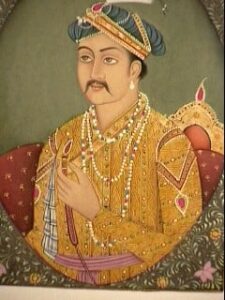Jalaluddin M. Akbar

Achievements:
- Expansion of the Mughal Empire: Akbar significantly expanded the Mughal Empire through conquests and diplomacy. His empire extended from Afghanistan to Bengal and from the Himalayas to the Godavari River.
- Military Conquests: Akbar’s major military victories include the conquest of Gujarat, Bengal, Rajputana, and Deccan regions. Notable battles include the Second Battle of Panipat in 1556, where he defeated Hemu, and the Siege of Chittorgarh in 1568.
- Administrative Organization: Akbar established a centralized administrative system with a bureaucracy that managed various aspects of governance. His ministers included notable figures like Raja Todar Mal and Birbal.
- Cultural Patronage: Akbar was a patron of the arts and culture. He fostered a cultural renaissance by promoting literature, music, painting, and architecture. His court was home to the nine jewels (Navaratnas), including the musician Tansen and the poet Abdul Rahim Khan-I-Khana.
Reforms:
- Religious Policies: Akbar is known for his policy of Sulh-i-Kul (universal peace), promoting religious tolerance and harmony. He abolished the Jizya tax on non-Muslims and invited scholars from various religions to his court for discussions, leading to the creation of a syncretic religion, Din-i-Ilahi.
- Revenue Reforms: Akbar introduced the Zabt system of revenue collection, which was based on the measurement of cultivated land. His finance minister, Raja Todar Mal, standardized land revenue systems, improving efficiency and state income.
- Administrative Reforms: He established the Mansabdari system, a military and administrative framework where officers (Mansabdars) were granted ranks and responsibilities. This system helped maintain a stable and loyal administrative structure.
- Judicial Reforms: Akbar reformed the judicial system to be more fair and efficient. He established a network of courts across the empire and appointed qualified judges (Qazis) to oversee legal matters.
Trivia and Lesser-Known Facts:
- Akbar was illiterate but possessed a remarkable memory and intellect. He could recall detailed discussions and enjoyed listening to readings from various texts.
- He married Rajput princesses, including Jodha Bai, to forge alliances with Rajput kingdoms, promoting political stability and cultural integration.
- Akbar was an enthusiastic patron of architecture, commissioning the construction of several iconic structures such as Fatehpur Sikri, the Buland Darwaza, and the Agra Fort.
- He was known for his interest in various religions and philosophies, which led him to host debates in his court with scholars of Hinduism, Islam, Christianity, Jainism, and Zoroastrianism.